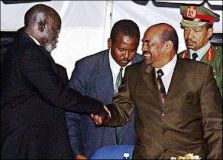Sudan govt, SPLA to compromise for constitution
By Opheera McDoom
KHARTOUM, April 13 (Reuters) – Work will begin on Sudan’s new constitution on April 23 after the government and former rebels agreed to make the process more inclusive by giving opposition forces greater representation, an official said on Wednesday.

|
|
Sudanese President Omar El Bashir (R) shakes hands with the leader of Sudan’s People Liberation Movement/Army John Garang after the signing of accords on two outstanding issues paving the way for the signing of a comprehensive peace deal. (AFP). |
Sudan signed a peace deal with the former Sudan People’s Liberation Army (SPLA) in January to end more than two decades of civil war in the south, but the discussions were hindered by demands from political parties demanding a greater role in forming the new constitution.
The peace deal outlines a power-sharing agreement in Sudan covering the make-up of the future government in which the ruling National Congress Party (NCP) gets 52 percent representation, the SPLA 28 percent, other northern political forces 14 percent and other southern parties 6 percent.
Yasir Arman, a senior SPLA official, said this formula for governing would not change. But both the NCP and the SPLA will give up seats to opposition forces on the commission to form the constitution as a special case to allow broader participation.
“The opposition parties want one-third of the seats and we are almost there,” he told Reuters after discussions with most political parties.”
We think we can reach an agreement with them,” he said, adding the commission would begin work on April 23.
The peace agreement signed in January was negotiated between the ruling NCP and the former rebel SPLA. Other parties — both in the north and the south — were not included in the talks.
An alliance of small southern parties has agreed to participate in the constitutional discussions.
Most of Sudan’s main northern opposition parties have also expressed their willingness to help form the constitution, including jailed opposition Islamist Hassan al-Turabi’s Popular Congress Party and the popular Democratic Unionist Party.
UMMA OPPOSITION
But the Umma Party, widely considered to be Sudan’s largest party and headed by the last elected leader Sadiq al-Mahdi, has set three prerequisites before joining, which the government and SPLA have rejected.
Umma party spokeswoman Mariam al-Mahdi said any decisions made by the commission should be made by consensus or by more than 80 percent of the commission, to allow opposition parties a real say in the process.
Arman said a two-thirds majority was needed and that would not change. This would give the SPLA and government ultimate control over any decisions.
Umma also wants to hold a national conference to allow the people of Sudan to endorse the peace deal, agreed by the SPLA and the government.
Arman said this would reopen the negotiations, which laboured for almost a decade before reaching the agreement in January.
“The Umma Party has opened up friendly fire upon the peace agreement,” he said. “The constitution will be based on the agreement — a political agreement is being put into a legal framework here,” he added.
Umma want the commission to be a truly national commission, Mahdi said, including parties from the east and the western Darfur region, where a rebellion has raged for more than two years.
Arman said the Darfur or eastern parties had not been contacted yet but the SPLA had suggested contacts be made to bring the two main Darfur rebel movements and the eastern parties into the process. But, he said, the issue had not been resolved yet.
